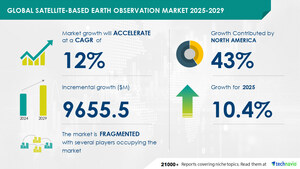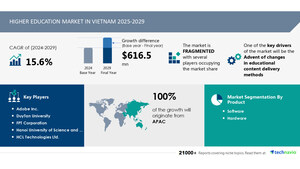NEW YORK, March 11, 2024 /PRNewswire/ -- The Smart Stadium Market is projected to grow by USD 50.70 billion from 2024 to 2028, with a CAGR of 30.15%. Enhanced operational efficiency is a key driver, as smart stadium solutions enable authorities to optimize energy use, automate processes, and improve crowd control. These solutions also offer real-time data integration with public transport and weather departments, enhancing overall efficiency and driving market demand during the forecast period.
Discover some insights on market size historic period (2017 to 2021) and Forecast (2023 to 2027) before buying the full report
Report Coverage |
Details |
Page number |
179 |
Base year |
2023 |
Historic period |
2018-2022 |
Forecast period |
2024-2028 |
Growth momentum & CAGR |
Accelerate at a CAGR of 30.15% |
Market Growth 2024-2028 |
USD 50.70 billion |
Market structure |
Fragmented |
YoY growth 2023-2024(%) |
28.65 |
Regional analysis |
Europe, North America, APAC, South America, and Middle East and Africa |
Performing market contribution |
Europe at 38% |
Key countries |
US, China, Japan, UK, and Germany |
Vendor Analysis
Vendor Landscape - The global smart stadium market is fragmented, with the presence of several global as well as regional vendors. Companies are implementing various strategies, such as strategic alliances, partnerships, mergers and acquisitions, geographical expansion, and product/service launches, to enhance their presence in the market.
The market forecasting report also includes detailed analyses of the competitive landscape of the market and information about 20 market companies, including:
- DB Schenker
- Dignia Systems Ltd.
- GP Smart Stadium
- Hawk Eye Innovations Ltd.
- Hewlett Packard Enterprise Co.
- Honeywell International Inc.
- Huawei Technologies Co. Ltd.
- Infosys Ltd.
- Intel Corp.
- International Business Machines Corp.
- Johnson Controls International Plc
- Lumen Technologies Inc.
- NEC Corp.
- Nippon Telegraph and Telephone Corp.
- Telefonaktiebolaget LM Ericsson
- Weblib
- DS worldwide Ltd.
Avaya LLC - The company offers sports team engagement mobile app that can digitize the fan experience before, during and after the game.
Cisco Systems Inc. - The company offers connected stadium solution that enables stadiums across the globe to address evolving market trends and fan needs with next-generation sports and entertainment experiences.
Dell Technologies Inc. - The company offers smart stadiums for addressing public safety emergencies, from surveillance cameras to biometric scanners.
For details on the vendor and its offerings
Segment Overview
Technavio has segmented the market based on type, Software (Digital content management, Building automation, Stadium and public security, Event management, and Others), Deployment (On-premises and Cloud-based), and Geography (Europe, North America, APAC, South America, and Middle East and Africa).
- The digital content management segment is poised for significant growth in the forecast period, focusing on video management, digital signage, and mobile content management. Valued at USD 1.62 billion in 2018, this segment facilitates content delivery to various endpoints, including smartphones and tablets. Mobile content management systems enable personalized content delivery to spectators, enhancing user experience. With increasing demand for tailored content and advertisements, the adoption of digital content management software is expected to surge, driving market growth.
Geography Overview
By geography, the global smart stadium market is segmented into Europe, North America, APAC, South America, and Middle East and Africa. The report provides actionable insights and estimates the contribution of all regions to the growth of the global smart stadium market.
- Europe is poised to contribute 38% to the global market growth, led by its vibrant sports culture and technological advancements in stadiums. The region, home to popular sports leagues like the PREMIER LEAGUE and Wimbledon, sees increased demand for smart stadiums among Generation Z fans accustomed to digital connectivity. Many stadiums have already implemented innovative solutions like LED lighting, pitch monitoring sensors, and eco-friendly heating and cooling systems. With ongoing initiatives to enhance fan engagement and stadium efficiency, Europe is set to drive market growth in the forecast period.
For insights on global, regional, and country-level parameters with growth opportunities from 2017 to 2027
Improved operational efficiency is notably driving the market growth:
- Improved operational efficiency is a key driver of market growth, as smart stadium solutions optimize energy use, enhance building management, and automate processes. These solutions enable real-time monitoring of temperature and lighting conditions, contributing to energy efficiency and cost reduction.
- Integration with external departments like public transport and weather services enhances crowd control by providing real-time data on weather conditions and traffic information. This integration improves overall stadium management, driving demand for smart stadium solutions during the forecast period.
The implementation of smart stadium solutions is significantly enhancing operational efficiency, energy management, and crowd control. These solutions enable real-time monitoring of temperature and lighting, optimizing energy usage and reducing operating costs. Integration with external departments further enhances crowd control by providing real-time weather and traffic data. These advancements are expected to drive market growth in the forecast period.
- Augmented reality (AR) is revolutionizing modernized stadiums, enhancing spectator experiences and boosting revenue through online auctions and merchandise sales.
- Rising implementation costs pose a significant challenge for the smart stadium market, driven by the adoption of cutting-edge technologies like high-definition screens and wireless connectivity.
Driver, Trend & Challenges are the factor of market dynamics which states about consequences & sustainability of the businesses, find some insights from a
Related Reports:
The stadium lighting market size is projected to increase by USD 224.38 million, at a CAGR of 7.8% between between 2023 and 2028.
The global football market size is estimated to grow by USD 599.29 million between 2023 and 2028. The market is accelerating at a compound annual growth rate of 3.45%.
Analyst Review:
The integration of sports venue technology is revolutionizing fan engagement and enhancing stadium infrastructure. IoT solutions, digital signage, and Wi-Fi connectivity are transforming the fan experience, with mobile apps and ticketing systems streamlining access. Security systems, powered by data analytics and real-time monitoring, ensure safety. Augmented reality and virtual reality offer immersive experiences, while artificial intelligence and machine learning drive operational efficiencies through cloud computing.
Sensor technology and biometric identification enable contactless payments and concession stand automation. Audiovisual systems and LED displays captivate crowds, while smart seating and interactive experiences personalize visits. Smart parking and wayfinding solutions optimize navigation, bolstered by communication networks and remote monitoring.
Performance tracking and emergency response systems enhance facility management, supported by sustainability initiatives like energy-efficient lighting and environmental controls. Venue design incorporates connectivity solutions for smart cities integration, and wearable technology offers interactive maps for in-stadium navigation.
The holistic integration of these technologies represents a paradigm shift in sports venue management, setting new standards for fan engagement and operational excellence.
Market Overview:
The smart stadium market is witnessing robust growth driven by advancements in sports venue technology, enhancing fan engagement, and upgrading stadium infrastructure. IoT solutions, digital signage, and Wi-Fi connectivity are revolutionizing the spectator experience, while mobile apps and ticketing systems streamline operations. Security systems and data analytics ensure safety and optimize performance, while real-time monitoring enhances operational efficiency. Augmented reality and virtual reality technologies offer immersive experiences, powered by artificial intelligence and machine learning. Cloud computing enables seamless connectivity and scalability, supported by sensor technology for biometric identification and contactless payments. Concession stand automation and audiovisual systems further enhance the fan experience, making smart stadiums integral components of modern sports entertainment.
About US
Technavio is a leading global technology research and advisory company. Their research and analysis focuses on emerging market trends and provides actionable insights to help businesses identify market opportunities and develop effective strategies to optimize their market positions. With over 500 specialized analysts, Technavio's report library consists of more than 17,000 reports and counting, covering 800 technologies, spanning across 50 countries. Their client base consists of enterprises of all sizes, including more than 100 Fortune 500 companies. This growing client base relies on Technavio's comprehensive coverage, extensive research, and actionable market insights to identify opportunities in existing and potential markets and assess their competitive positions within changing market scenarios.
Contact
Technavio Research
Jesse Maida
Media & Marketing Executive
US: +1 844 364 1100
UK: +44 203 893 3200
Email: [email protected]
Website: www.technavio.com/
SOURCE Technavio

WANT YOUR COMPANY'S NEWS FEATURED ON PRNEWSWIRE.COM?
Newsrooms &
Influencers
Digital Media
Outlets
Journalists
Opted In




Share this article